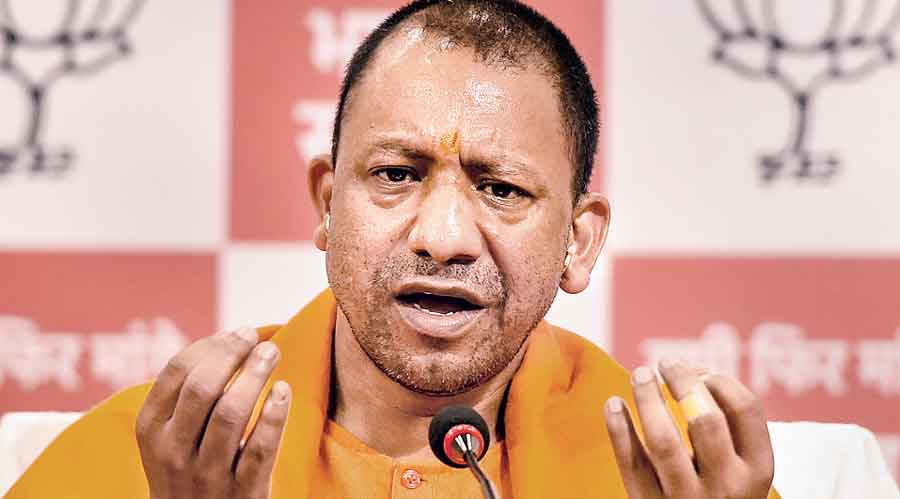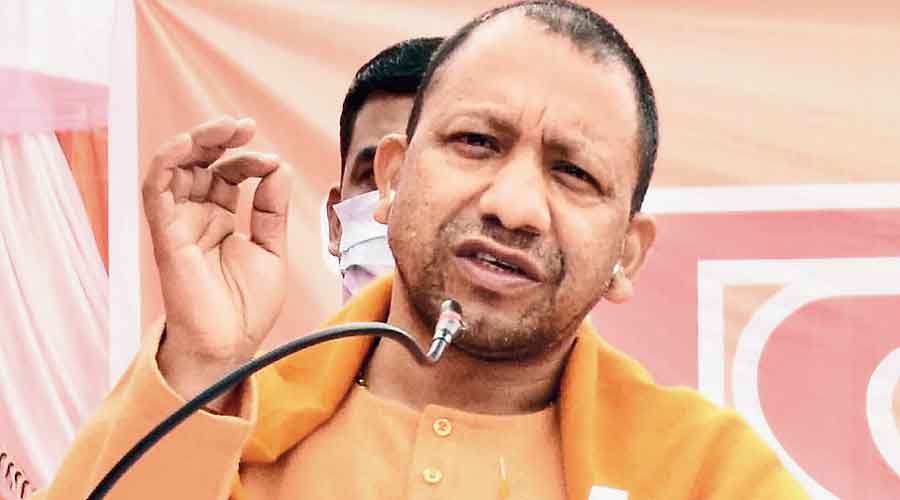Driving from Delhi towards Bulandshahr in western Uttar Pradesh, through Greater Noida and Sikandrabad, the overwhelming sentiment one sees in favour of the BJP appears to suggest a one-sided election.
But by the time one has criss-crossed dusty towns and lush green villages through Khurja, Aligarh and Iglas to reach Mathura, the pro-BJP mood seems to have given way to discontent and anger.
In Sikandrabad and Bulandshahr, OBC voters Sohan Lal, Hari Saini and Chhote Beldar had hailed Prime Minister Narendra Modi and chief minister Yogi Adityanath for providing them with free rations, a pucca house under the PM Awas Yojana and, above all, freedom from “gundagardi” (crime).
But in Aligarh and Mathura, Brahmins, Jats and Dalits voiced their anger at the prevailing “Thakurvaad” (dominance of Thakurs, the caste to which Adityanath belongs), farm distress, price rise and unemployment.
Sitting in front of his chain of shops on the outskirts of Mathura town, Jai Dev Pandit spoke about an atmosphere of “darr” (fear) under Adityanath’s “akramak” (aggressive) “tanashahi” (autocratic rule). It was hard to believe one’s ears — a Brahmin speaking of fear in the Krishna temple town.
“Darr sirf Musalman me hi nahi, Hindu me bhi hai. Koi bhi ho, Yogi Baba ke khilaf ek bhi shabd bolne se darta hai (It’s not Muslims alone who are afraid; Hindus are too. No one dares say a word against Adityanath),” Jai Dev said.
Brahmin organisations in Mathura have held meetings to vent their frustration at the chief minister’s “aggressiveness” and appeal to voters not to support BJP power minister Shrikant Sharma, who is seeking re-election from the Mathura seat.
Fears of cracks in its loyal Brahmin vote bank — now bristling across Uttar Pradesh at Adityanath’s alleged pro-Thakur bias — has led the BJP to form a committee of leaders to assuage and woo the community.
But in Mathura, Shrikant — the lone Brahmin contestant in the constituency — has been facing protests for being a “non-performer”.
“Shrikant Sharma has proved useless. Our electricity bills have doubled and trebled, civic conditions have worsened, and the Yamuna is as dirty as ever,” said Harekrishna Agrawal, a stationery shop owner in Mathura town.
Agrawal, however, believes “the people will vote for the BJP” — but “only for the sake of Hindutva and because of the lack of a viable alternative”.
In Shahpur village, a few kilometres from Mathura town, Jat farmer Birpal Chowdhury said his community’s “love for the BJP” was over.
He praised Modi for the construction of the Ram temple in Ayodhya but said discontent over the government’s treatment of farmers would prompt most Jats to vote for the Samajwadi Party-Rashtriya Lok Dal alliance, which has emerged as the principal challenger to the BJP.
The Rashtriya Lok Dal (RLD), led by Jayant Chaudhary, champions the cause of farmers in general and Jats in particular.
“I was a BJP worker, but no longer. Farming has turned unprofitable and there are no jobs,” said Om Chaudhary, a young man from Shahpur.
“Itne bure din kabhi nahi dekha (I have never seen such bad times),” he rued, turning upside down Modi’s 2014 campaign slogan of “achchhe din” (good days).
The Brahmins and the Jats had voted overwhelmingly for the BJP in the 2017 Assembly polls, helping the party sweep western Uttar Pradesh, so an erosion in their votes could cost the BJP heavily.
The BJP’s three main advantages are the perception of a huge improvement in law and order, the free rations given to the poor amid the pandemic, and the annual central cash dole of Rs 6,000 to marginal farmers.
However, while these three factors might help the BJP retain most of its OBC votes, for many other communities the joblessness and economic distress outweigh everything else.
“The BJP is trying to buy our votes by giving free rations. We don't want anything free — give us jobs,” said Bablu Kumar, a Dalit youth in Iglas.
Bablu flagged the student protests against unemployment in Allahabad (now Prayagraj) and Bihar and the repeated cancellations of recruitment exams in Uttar Pradesh.
“Youths from all castes are suffering because of the lack of jobs. We will vote either for the BSP (Bahujan Samaj Party) or for the SP-RLD alliance – but not for the BJP,” he said.
At Iglas market, young Jat woman Payal Chowdhury echoed Bablu. She had come out with women relatives to catch a glimpse of Congress general secretary Priyanka Gandhi, who had arrived to campaign.
“Where are the jobs Modiji and Yogiji promised?” a visibly angry Payal said. She accused Adityanath of focusing only on Hindu-Muslim polarisation.
“I’m now doing BEd after graduation. I’ve been looking for a job but there is none,” she said.
The Congress has fielded the locally popular social worker Preeti Dhankar from the reserved (Scheduled Caste) Iglas seat. She may not win but the BJP is worried at the prospect of her denting the votes of the Dalit Baghel caste, to which she belongs, and paving the way for an SP-RLD victory. Baghels are known BJP supporters.
Local BJP managers claimed they had launched “micro-management” on a massive scale to “contain the damage”.
“We are aware of the likely loss of votes but are trying to minimise it to a tolerable level,” a BJP leader in Mathura said.
He said the party’s toughest challenge was to arrest the attrition in its support base as the polling moved from western Uttar Pradesh to the state’s central and eastern regions.
The BJP and its allies had won 325 of the state’s 403 seats the last time. This time, the party’s goal seems to be not to let the tally slide below 250.
Bulandshahr, Aligarh and Mathura vote in the first phase on February 10.











